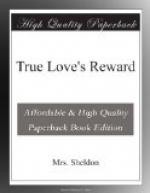“If I could tell you what?” Louis inquired, while he wondered what thought could have so suddenly blanched her face, and sent that look of terror into her beautiful eyes.
“Oh, I want to know—did he—how did my father die?” the young girl cried, in faltering, trembling tones.
Louis Hamblin regarded her with unfeigned astonishment at the question.
“How did your father die?” he repeated. “Why, like any other respectable gentleman—in his own house, and of an incurable disease.”
“Oh! then he did die a natural death,” breathed Mona, with a sigh of relief that was almost a sob.
“Certainly. Ah!” and her companion appeared suddenly to divine her thoughts, “so you imagined that Walter Dinsmore killed Richmond Montague for the wrong done your mother! Ha! ha! I have no doubt that he felt bitter enough to commit murder, or almost any other act of violence, to avenge her; but let me assure you, Miss Montague, that that high-toned gentleman never soiled his hands with blood; and if that was your thought—”
“It is no matter what I thought,” Mona hastily, but coldly, interposed, for she had no intention of confessing any such suspicion; but she was greatly relieved to learn that it had no foundation, and she now bitterly reproached herself for having even momentarily entertained a thought of anything that had been so foreign to her uncle’s noble nature.
“To go back to what we were speaking of before,” she continued, gravely, “will you furnish me with tangible proof of my mother’s marriage? I know that she eloped with Richmond Montague, that they lived together for several months, when he suddenly deserted her, and that there is some mystery connected with that event—something which my uncle hesitated or feared to tell me. I know, too, that he was very anxious to reveal something more to me when he lay dying, and could not, because he had been stricken speechless. But for that fact, I believe I should not now be obliged to ask this favor of you,” she concluded, flushing.
“Does it gall you so much, to ask a favor of me?” he inquired, bitterly. “But why,” he went on, without waiting for a reply, “are you so exceedingly anxious to obtain this proof? Do you expect by the use of it to secure to yourself the property left by your father? Was that your object in remaining in my aunt’s family under an assumed name?”
“No!” Mona vehemently returned. “I would not touch one dollar of his money. I would scorn to profit by so much as a penny of the fortune left by the man who deserted his wife in her sad extremity, and then, when death freed him from the tie which bound him to her, married a woman whom he did not love; who possessed so little of fatherly instinct in his nature, that he never acknowledged his child, nor betrayed the slightest interest in or affection for her. I would never own him for such a purpose; while, were it not for the sake of establishing my mother’s honor, I would even repudiate the name I bear,” she concluded, looking so proud and beautiful in her righteous scorn that the young man gazed upon her with admiration.




